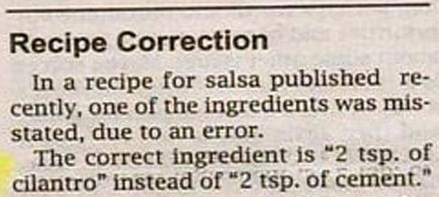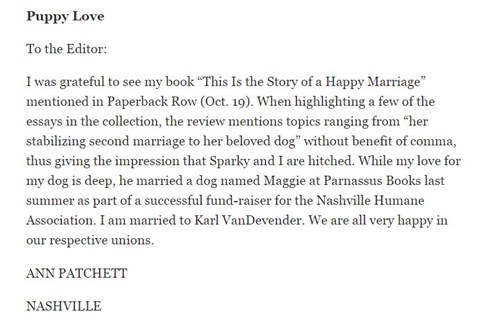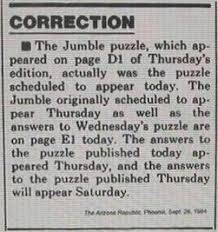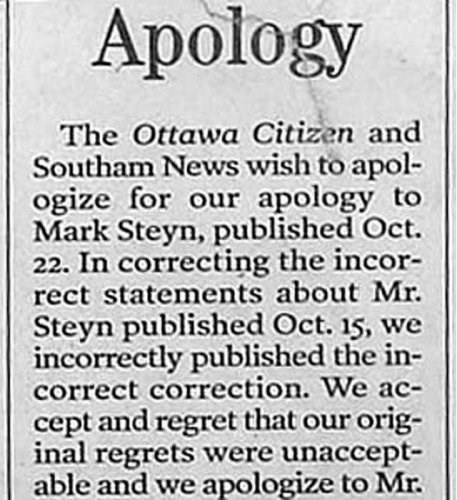Mistakes happen in newspapers.
During my early career as a journalist, I once reported that one of the areas I covered was about to get a new £50 town centre, and managed to write a profile piece on the new ‘rabbit’ who had been appointed to the local synagogue.
And then of course there was the robber who held up a shop while holding a ‘fireman'.
All pretty embarrassing, and I can assure you your colleagues never let you forget.
But I guess I can laugh about it now (either that or this media training blog is acting as some form of long-awaited therapy).
Fortunately I don’t recall every having to print a correction or apology for any of these errors (although I should take this opportunity to apologise for the mistakes in the subject line of one of our recent eShots).
But some journalists have not been so fortunate.
Here are some of my favourite newspaper corrections:
Important clarification
The Morning Sentinel in Illinois was forced into rather an embarrassing correction following a story on a local band. The paper reported that Jon Henninger’s bandmate was ‘on drugs’.
Its subsequent apology clarified that he had in fact been ‘on drums’.
This is brilliant. pic.twitter.com/UBUKG6DrhH
— Shehab Khan (@ShehabKhan) March 31, 2017
Spelling test
The Guardian’s corrections and clarifications page included a classic correction back in 2007. The paper informed readers it had managed to spell the word misspelled twice in a previous clarifications column, opting for the unconventional spelling ‘mispelled’.

Alternative diet
One of the more unusual newspaper corrections came in the Financial Times last year. In an article about Indian businessman Vijay Mallya, it claimed that Moraji Desai, the former Prime Minister of India, had a habit of drinking cow urine.
The story was later amended to clarify that it was actually his own urine that he chose to drink.
Although neither option sounds particularly palatable, Desai lived to be 99 years old.
A crucial correction appended to a @FinancialTimes interview of Vijay Mallya: https://t.co/zeTzD25xls pic.twitter.com/BbAfydkB91
— Samanth Subramanian (@Samanth_S) May 5, 2016
Papering over the cracks
Although clearly not a newspaper, Vogue magazine made a memorable blunder in a feature on Chelsea Clinton, when it described Dan Baer as an 'interior designer'.
A subsequent ‘editor’s note’ clarified that he was in fact deputy assistant secretary for the Bureau of Democracy, Human Rights, and Labor at the US Department of State.
He is, however, believed to have very fine taste in wallpaper.
Correction of the year - Vogue magazine mistakenly calling Assist Sc of State Dan Baer an interior designer pic.twitter.com/Z4YcFf40 #fb
— Stephen Morgan (@strmrgn) December 13, 2012
Crunchy recipe
The food and drink sections of newspapers do not often require apologies.
But one publication was forced to say sorry to its readers after a mistake in one of its recipes left readers with more than they could chew.
Instead of two teaspoons of cilantro, the salsa recipe mistakenly included two teaspoons of ‘cement’.

Grammar matters
When the New York Times carried a review of Ann Pratchett’s book ‘This is the story of a Happy marriage’, a missing comma created the impression she was in fact hitched to her pet dog.
The article said the book mentioned topics ranging from ‘her stabilizing second marriage to her beloved dog’.
The error was corrected by the author herself in a letter to the publication in which she said that while she did love her dog, she was in fact married to a man.

A puzzling response
When the Arizona Republic Phoenix got itself in something of a muddle with its puzzle, its correction turned out to be the biggest head scratcher.
Surely only the most ardent puzzle participants could really understand what this meant:
‘The Jumble puzzle, which appeared on D1 of Thursday’s edition, actually was the puzzle scheduled to appear today. The Jumble originally scheduled to appear Thursday as well as the answers to Wednesday’s puzzle are on page E1 today. The answers to the puzzle published today appeared Thursday, and the answers to the puzzle published Thursday will appear Saturday.’

Apologising for the apology
My favourite newspaper correction, however, belongs to The Ottawa Citizen and Southam News, which found itself in the unusual and somewhat embarrassing predicament of having to apologise for its own apology.
The publication said that ‘in correcting the incorrect statements’ it ‘incorrectly published the incorrect correction’ and, somewhat unusually, went on to express regret that its 'original regrets were unacceptable'.

Media First are media and communications training specialists with over 30 years of experience. We have a team of trainers, each with decades of experience working as journalists, presenters, communications coaches and media trainers.
Click here to find out more about our journalist-led media training courses.
Subscribe here to be among the first to receive our blogs.


